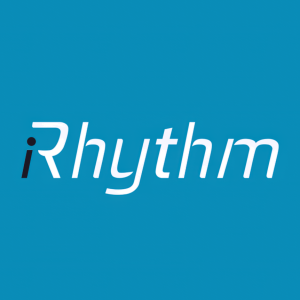New Research Presented at American Heart Association’s 2023 Scientific Sessions Demonstrates Performance of Continuous Monitoring ECG Data for Improved Prediction of Heart Failure Hospitalization
- The collaboration with Duke Health and the findings presented at the AHA's Scientific Sessions demonstrate iRhythm's commitment to advancing predictive heart failure monitoring.
- The study's results show the potential of incorporating ambulatory ECG data from long-term continuous monitoring to improve risk prediction of cardiovascular events, particularly heart failure hospitalization.
- None.
Study findings from a collaboration with Duke Health found that a model that incorporates ECG data from long-term continuous monitoring resulted in more accurate prediction of heart failure hospitalization compared to clinical risk models
SAN FRANCISCO, Nov. 13, 2023 (GLOBE NEWSWIRE) -- iRhythm Technologies, Inc. (NASDAQ:IRTC) today announced the results of a new retrospective analysis, conducted in partnership with Duke Health, that found incorporating ECG data from long-term continuous monitoring can more accurately predict heart failure hospitalization compared to clinical history or risk scores alone. This data was presented at the American Heart Association’s (AHA) 2023 Scientific Sessions in Philadelphia held November 11-13.
The findings of this retrospective analysis of 224,682 patients with 14-day long-term continuous monitoring and clinical data show that a new predictive model for heart failure hospitalization that adds ambulatory ECG features to clinical risk factors resulted in a more accurate discrimination of future heart failure hospitalization (C-statistic 0.85) compared to clinical risk scores such as CHA2DS2-VASc (0.73) or atrial fibrillation (Afib) burden alone (0.59). The ambulatory ECG findings with the greatest predictive value were the presence of premature ventricular couplets and presence of Afib. Minimal and maximum heart rate, commonly found in over-the-counter wearable devices, were not predictive or informative.
“Risk prediction of cardiovascular events often focuses on a patient's medical history, age, and sex but fails to incorporate heart rhythm monitoring data,” said Jonathan Piccini, MD, MHS, director of cardiac electrophysiology at Duke Health and professor of medicine in cardiology at Duke University School of Medicine. “By incorporating ambulatory ECG data from long-term continuous monitoring, risk prediction of cardiovascular events improves. In particular, we have found that arrhythmias such as Afib and ventricular ectopy are highly associated with new-onset heart failure and heart failure hospitalization.”
The investigators evaluated Medicare beneficiaries who underwent long-term ambulatory monitoring in the US. Clinical data from Centers for Medicare and Medicaid Services were linked with continuous ambulatory ECG data from iRhythm in order to develop a predictive model for heart failure hospitalization. Multiple variables were then analyzed to determine the most clinically relevant prognostic factors for those patients hospitalized with heart failure within one year.
“Ambulatory ECG monitoring has long been used only to diagnose the arrhythmias that are recorded,” said Mintu Turakhia, MD, MAS, chief medical officer, chief scientific officer and executive vice president, product innovation at iRhythm. “However, 14 days of uninterrupted ECG signal has a wealth of information that could be highly prognostic and predictive. What the investigators in this study have shown is that this signal data provides incremental predictive value for important actionable events — in this case heart failure hospitalization. Moreover, the continuous ECG features that informed the model — like PVC couplets — are not findings that you will readily capture on traditional 10-second ECGs, 30-second rhythm strips, or consumer-grade wearable devices.”
An estimated 6.2 million adults in the U.S. and 65 million globally are affected by heart failure1, a multi-faceted and life-threatening syndrome characterized by significant morbidity and mortality, poor functional capacity and quality of life, and high costs.2 However, risk stratification for heart failure hospitalization that could guide upstream disease management and improve outcomes has remained an unmet clinical need.
The research presented is a retrospective analysis as part of a scientific study only and is not part of any commercial product offering in any market. To learn more about iRhythm, please visit https://www.irhythmtech.com/.
About iRhythm Technologies, Inc.
iRhythm is a leading digital health care company that creates trusted solutions that detect, predict, and prevent disease. Combining wearable biosensors and cloud-based data analytics with powerful proprietary algorithms, iRhythm distills data from millions of heartbeats into clinically actionable information. Through a relentless focus on patient care, iRhythm’s vision is to deliver better data, better insights, and better health for all.
Investor Relations Contact:
Stephanie Zhadkevich
(919) 452-5430
investors@irhythmtech.com
iRhythm Media Contact:
Saige Smith
(262) 289-7065
irhythm@highwirepr.com
1 Savarese, Gianluigi et al. Global burden of heart failure: a comprehensive and updated review of epidemiology. Cardiovascular research, 2023.
2 Virani, Salim et al. Heart Disease and Stroke Statistics—2020 Update. American Heart Association, 2020.
The content of this press release is associated with a study. Zio XT and Zio Monitor Long Term Continuous Monitors (LTCMs) are prescription-only, single patient use, continuously recording ECG monitors that can be worn for up to 14 days. They are indicated for use on patients who may be asymptomatic or who may suffer from transient symptoms. Zio LTCMs are not FDA-cleared to predict disease states.








